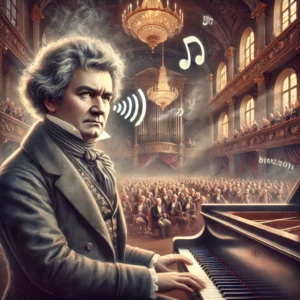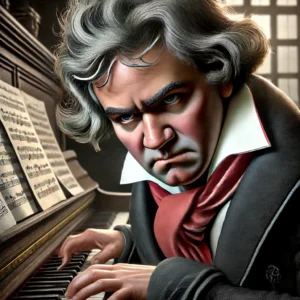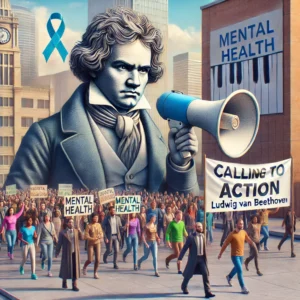Ludwig van Beethoven, one of the most influential and celebrated composers of all time, is a figure whose musical talent has left an indelible mark on the history of classical music. However, behind his masterful symphonies and thrilling sonatas, there was a man who constantly struggled with his own inner demons. In this blog, we will explore Beethoven’s life from a unique perspective: his personality and emotions, and how his mental health issues influenced his art. We hope that by understanding his story, we can offer hope to those facing mental disorders and highlight the importance of combating the stigma associated with these problems.
Beethoven: A Musical Genius
A Child Prodigy with a Difficult Beginning
 Beethoven was born on December 17, 1770 in Bonn, Germany, into a musical but dysfunctional family. His father, Johann van Beethoven, was a moderately talented musician who had high expectations for his son. Johann tried to mold Ludwig into a musical prodigy, often using harsh and strict methods that today would be considered child abuse. Imagine Beethoven, at only six years old, having to practice the piano for endless hours under the strict watch of his father, who, incidentally, would not be out of place on an episode of “First Time Parents Anonymous.”
Beethoven was born on December 17, 1770 in Bonn, Germany, into a musical but dysfunctional family. His father, Johann van Beethoven, was a moderately talented musician who had high expectations for his son. Johann tried to mold Ludwig into a musical prodigy, often using harsh and strict methods that today would be considered child abuse. Imagine Beethoven, at only six years old, having to practice the piano for endless hours under the strict watch of his father, who, incidentally, would not be out of place on an episode of “First Time Parents Anonymous.”
Thus began the trajectory of a great man who may have witnessed firsthand the link between mental disorders and creative genius.
The Rise to Fame and the Onset of Deafness
 Despite his difficult childhood, Beethoven’s talent was undeniable. At 21, he moved to Vienna, the musical capital of Europe at the time, to study with Joseph Haydn. He soon established himself as a virtuoso pianist and innovative composer. However, just as his career was beginning to take off, Beethoven began to notice the first signs of deafness, a devastating blow to any musician.
Despite his difficult childhood, Beethoven’s talent was undeniable. At 21, he moved to Vienna, the musical capital of Europe at the time, to study with Joseph Haydn. He soon established himself as a virtuoso pianist and innovative composer. However, just as his career was beginning to take off, Beethoven began to notice the first signs of deafness, a devastating blow to any musician.
We can imagine Beethoven in our times, Googling “What to do when you start going deaf as a musician?” He would probably find useless answers like “turn down the volume” or “try the flute.” His despair was real and profound. Progressive deafness led him to isolate himself and struggle with feelings of hopelessness and frustration. Yet, his ability to compose masterpieces such as “Symphony No. 9” while struggling with his disability is a testament to his incredible strength and resilience.
His struggle with the mind
A Man of Intense Emotions
 Beethoven was not only known for his music, but also for his volatile personality. He was known for his fiery temper and extreme mood swings. His secretary, Anton Schindler, related that Beethoven often had fits of anger and could be terribly impatient. If Beethoven were alive today, he would probably be a star on a reality show, where his temper would be as famous as his sonatas.
Beethoven was not only known for his music, but also for his volatile personality. He was known for his fiery temper and extreme mood swings. His secretary, Anton Schindler, related that Beethoven often had fits of anger and could be terribly impatient. If Beethoven were alive today, he would probably be a star on a reality show, where his temper would be as famous as his sonatas.
Despite his temper, Beethoven had a deep capacity for love and affection. His letters, especially those he wrote to his “Immortal Beloved,” reveal a passionate and sensitive man. Beethoven never married, and his love life was complicated and often unhappy, which exacerbated his emotional problems. It is as if Beethoven was trapped in a perpetual romantic drama, with tragic violins playing in the background.
The Struggle with Mental Health
 In addition to his deafness, Beethoven also faced other health problems, both physical and mental. It is believed that he suffered from bipolar disorder, which would explain his extreme mood swings and periods of intense creative energy followed by bouts of deep depression. Today, we might imagine Beethoven in therapy, trying to explain his emotional ups and downs while the therapist frantically takes notes, trying to keep up with his stories.
In addition to his deafness, Beethoven also faced other health problems, both physical and mental. It is believed that he suffered from bipolar disorder, which would explain his extreme mood swings and periods of intense creative energy followed by bouts of deep depression. Today, we might imagine Beethoven in therapy, trying to explain his emotional ups and downs while the therapist frantically takes notes, trying to keep up with his stories.
Despite his struggles, Beethoven never let his mental health issues define him. His music, full of emotion and complexity, reflects his inner battles and his ability to turn pain into beauty. His famous “Symphony No. 5,” with its “fate knocking at the door” motif, is a perfect example of how he channeled his anguish into a masterpiece that resonates with the human soul.
(…) our struggles do not define us; it is our ability to move forward and find ways to express our humanity that really matters.
The Importance of Fighting Stigma
 Beethoven’s story is a powerful reminder that mental disorders can affect anyone, regardless of talent, success, or status. Facing mental health problems is not a sign of weakness, and the stigma associated with these problems only compounds the suffering of those who are already struggling.
Beethoven’s story is a powerful reminder that mental disorders can affect anyone, regardless of talent, success, or status. Facing mental health problems is not a sign of weakness, and the stigma associated with these problems only compounds the suffering of those who are already struggling.
Today, it is crucial that we recognize the importance of mental health and work together to eliminate stigma. People facing mental disorders need support and understanding, not judgment. As a society, we must foster an environment where it is safe and acceptable to talk about mental health and seek help when needed.
Beethoven as a Source of Inspiration
 Beethoven’s life, with all its difficulties and triumphs, offers a source of inspiration for all of us. His ability to create amazing music despite his personal challenges demonstrates that it is possible to find beauty and meaning in even the most difficult circumstances. As one of the great personalities who faced mental illness, his legacy teaches us that our struggles do not define us; it is our ability to move forward and find ways to express our humanity that truly matters.
Beethoven’s life, with all its difficulties and triumphs, offers a source of inspiration for all of us. His ability to create amazing music despite his personal challenges demonstrates that it is possible to find beauty and meaning in even the most difficult circumstances. As one of the great personalities who faced mental illness, his legacy teaches us that our struggles do not define us; it is our ability to move forward and find ways to express our humanity that truly matters.
For those facing mental disorders, Beethoven’s story offers hope. If a man who struggled with deafness and emotional disorders could compose some of the most beautiful and enduring pieces in the history of music, then it is also possible for us to find ways to overcome our own challenges and create something meaningful.
A Call to Action
 In honor of Beethoven and all those facing mental health issues, let’s make a conscious effort to combat stigma. Let’s support our friends, family and colleagues who are struggling. Let’s talk openly about mental health and foster an environment of compassion and understanding.
In honor of Beethoven and all those facing mental health issues, let’s make a conscious effort to combat stigma. Let’s support our friends, family and colleagues who are struggling. Let’s talk openly about mental health and foster an environment of compassion and understanding.
Let’s remember that mental health is everyone’s concern. No one is exempt from facing these issues, and together we can make a difference. At the end of the day, we are all human, and as Beethoven showed us through his music, it is our shared humanity that unites and strengthens us.
Conclusion
Ludwig van Beethoven, with his musical genius, his personal struggles, and his extraordinary talent, left us a legacy that goes beyond music. He taught us about resilience, the importance of mental health, and a profound insight into how personal difficulties can influence and sometimes enhance artistic expression. Her life reminds us that even though we face challenges, we can always find ways to turn our difficulties into something beautiful.
So the next time you listen to a Beethoven symphony, remember the man behind the music, his struggles and his triumphs. And may his story inspire you to be more compassionate with yourself and others, to seek help when you need it, and to never let stigma hold you back.
We hope his story inspires those facing mental disorders and underscores the importance of empathy and eliminating stigma.
Beethoven’s music is not only a legacy of beauty and emotion, but also a testament to the human capacity to overcome adversity and create something truly extraordinary.
Do you also face or did you face mental illness?
Anxiety, anorexia, bipolar, borderline, bulimia, depression, schizophrenia, or another mental health issue?
 ENTER THE “LIGHTS IN THE DARK CONTEST”.
ENTER THE “LIGHTS IN THE DARK CONTEST”.
Tell a story about struggle, stigma, emotions, and overcoming around a mental health problem that you or a family member or loved one has experienced. It helps fight stigma, showing that people with a mental health issue can, yes, be creative and productive.
![]() 𝗣𝗨𝗘𝗗𝗘𝗦 𝗚𝗔𝗔𝗡𝗔𝗥 a cash prize of up to 5,000 Euros.
𝗣𝗨𝗘𝗗𝗘𝗦 𝗚𝗔𝗔𝗡𝗔𝗥 a cash prize of up to 5,000 Euros.
There are several prizes and you can participate in up to 2 categories.
![]() People of any country and age can participate. In the form of 𝘁𝗲𝘅𝘁𝗼; in the form of a song, drawing, photograph, painting or video; or in the form of a creative social network if you have a social network profile that seeks to help with the issue. There is also a category for professionals working in mental health.
People of any country and age can participate. In the form of 𝘁𝗲𝘅𝘁𝗼; in the form of a song, drawing, photograph, painting or video; or in the form of a creative social network if you have a social network profile that seeks to help with the issue. There is also a category for professionals working in mental health.
![]() You can also participate as an association or support center.
You can also participate as an association or support center.
![]() If you are a success story, your participation is very important because it gives hope. SHINE YOUR LIGHT!
If you are a success story, your participation is very important because it gives hope. SHINE YOUR LIGHT!
The BELO Project is promoted by Fundación Europamundo and Rotary (Club Madrid Corporate), with the support of CaixaBank through Fundación “la Caixa”, Hermanas Hospitalarias Aita Menni, AMAFE, LEALTIC Transformación Digital para PyMEs y MiPyMEs, Andersen in Spain, Fundación Internacional UNIVERSITAS XXI, Fundación El Buen Samaritano Madrid, and other respected institutions and companies in Spain and the world.
![]() Why a contest? bit.ly/belo-presentacion-es
Why a contest? bit.ly/belo-presentacion-es
![]() Together, the grains of sand form dunes. Help us spread the Lights In The Darkness Contest to as many people as possible. Share with your contacts, family and friends. People who face or have faced mental health problems do not always go through associations, hospitals or professionals; but they can be in the neighbor, in the company, in the club, in the street. Don’t look the other way. add your light! ¡𝗖𝗢𝗠𝗣Á𝗥𝗧𝗘𝗟𝗢!
Together, the grains of sand form dunes. Help us spread the Lights In The Darkness Contest to as many people as possible. Share with your contacts, family and friends. People who face or have faced mental health problems do not always go through associations, hospitals or professionals; but they can be in the neighbor, in the company, in the club, in the street. Don’t look the other way. add your light! ¡𝗖𝗢𝗠𝗣Á𝗥𝗧𝗘𝗟𝗢! ![]()
Featured Works by Ludwig van Beethoven
Ludwig van Beethoven composed a wide variety of works throughout his career, spanning multiple musical genres. Here are some of his most significant compositions:
1. Symphonies
– Symphony No. 1 in C major, Op. 21 (1799-1800)
– Symphony No. 2 in D major, Op. 36 (1801-1802)
– Symphony No. 3 in E-flat major, Op. 55 “Eroica” (1803)
– Symphony No. 4 in B-flat major, Op. 60 (1806)
– Symphony No. 5 in C minor, Op. 67 (1804-1808)
– Symphony No. 6 in F major, Op. 68 “Pastoral” (1808)
– Symphony No. 7 in A major, Op. 92 (1812)
– Symphony No. 8 in F major, Op. 93 (1812)
– Symphony No. 9 in D minor, Op. 125 “Choral” (1824)
2. Concertos
– Piano Concerto No. 1 in C major, Op. 15 (1795)
– Piano Concerto No. 2 in B flat major, Op. 19 (1795)
– Piano Concerto No. 3 in C minor, Op. 37 (1800)
– Piano Concerto No. 4 in G major, Op. 58 (1805-1806)
– Piano Concerto No. 5 in E flat major, Op. 73 “Emperor” (1809)
– Violin Concerto in D major, Op. 61 (1806)
3. Piano Sonatas
– Piano Sonata No. 8 in C minor, Op. 13 “Pathetique” (1798)
– Piano Sonata No. 14 in C sharp minor, Op. 27 No. 2 “Moonlight” (1801)
– Piano Sonata No. 17 in D minor, Op. 31 No. 2 “The Tempest” (1802)
– Piano Sonata No. 21 in C major, Op. 53 “Waldstein” (1804)
– Piano Sonata No. 23 in F minor, Op. 57 “Appassionata” (1805)
– Piano Sonata No. 26 in E flat major, Op. 81a “The Farewells” (1809)
– Piano Sonata No. 29 in B-flat major, Op. 106 “Hammerklavier” (1817-1818)
4. Chamber Music
– String quartets, including Op. 18 and Op. 59 “Razumovsky”.
– Septet in E-flat major, Op. 20 (1799-1800)
– Piano Trio, Op. 1 No. 1-3 (1795)
5. Other Notable Works
– Mass Solemnis in D major, Op. 123 (1823)
– Fidelio, Op. 72 (opera, 1805-1814)
Note: The images used in this article are merely illustrative and were created with artificial intelligence.
Sources
For detailed information on Beethoven’s life and works, the following sources were consulted:
Beethoven’s biography and works – Britannica: https://www.britannica.com/biography/Ludwig-van-Beethoven
Beethoven’s Complete Works – IMSLP – Beethoven’s Complete Works: https://imslp.org/wiki/Category:Beethoven,_Ludwig_van
Beethoven’s history and mental health – Beethoven: Anguish and Triumph by Jan Swafford: https://www.amazon.com/Beethoven-Anguish-Triumph-Jan-Swafford/dp/061805474X
Analysis of Beethoven’s emotional life – The Guardian – Beethoven’s mental health: https://www.theguardian.com/music/2015/jul/11/beethoven-mental-health

